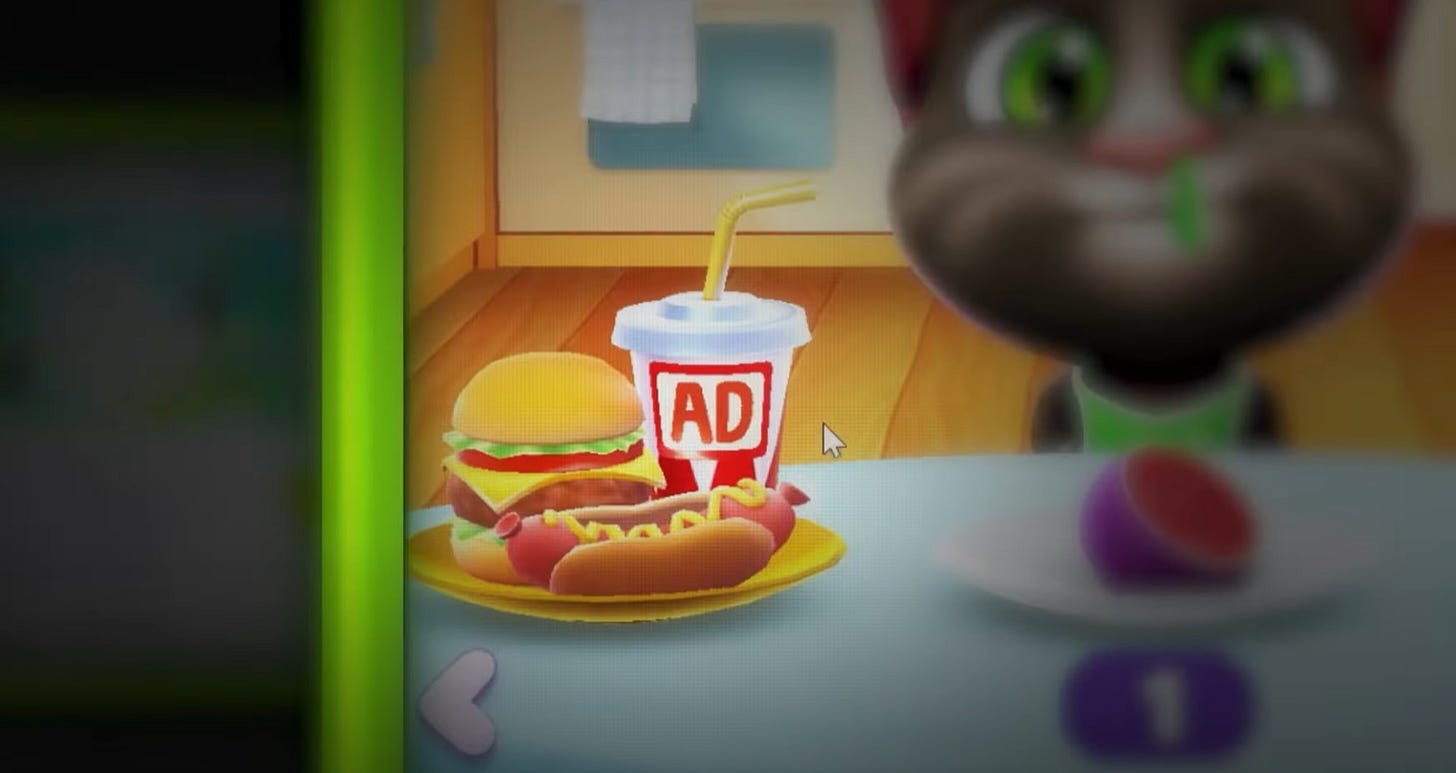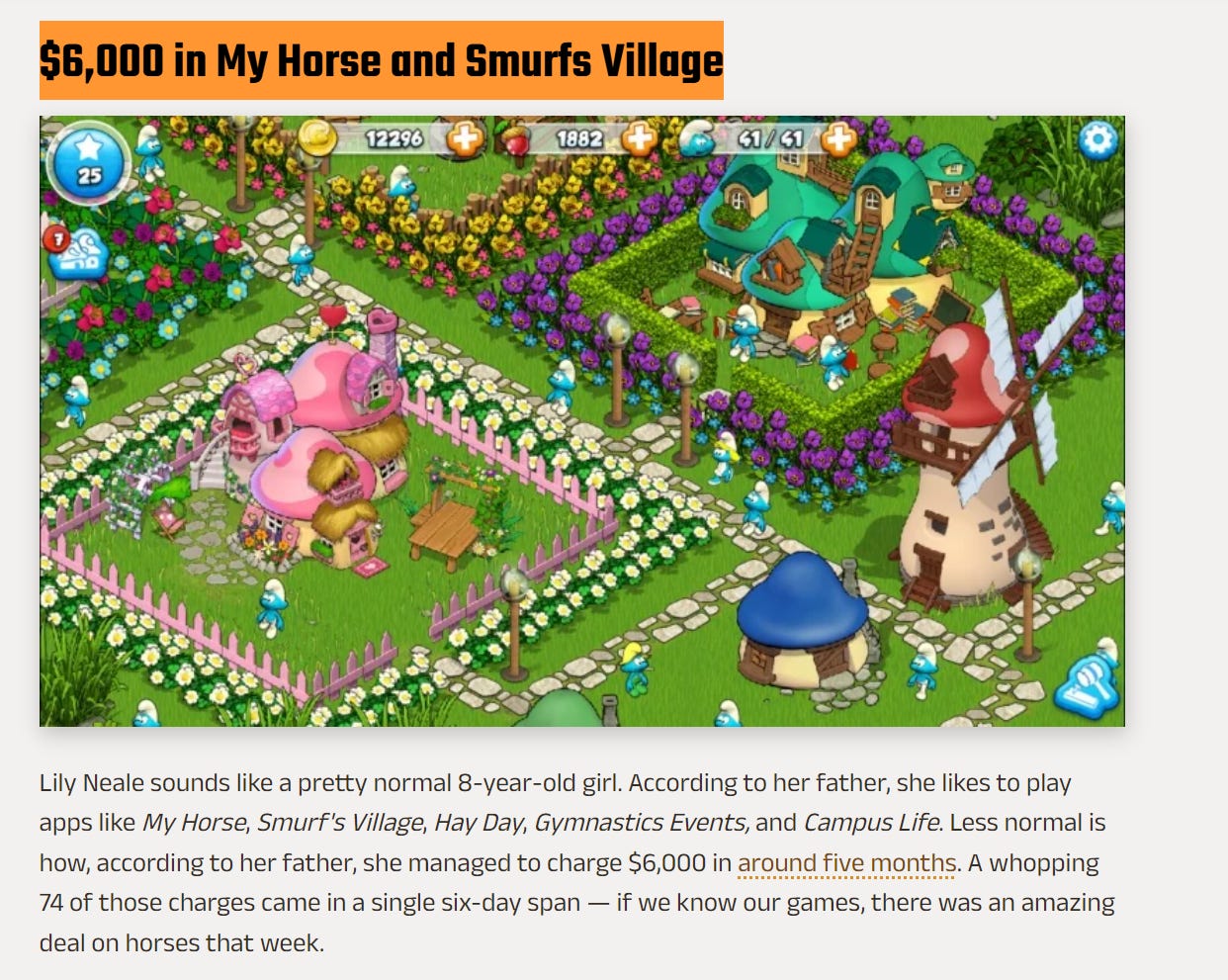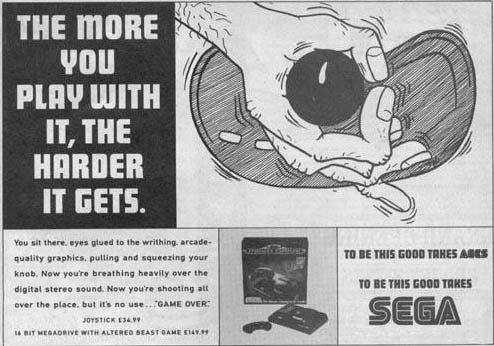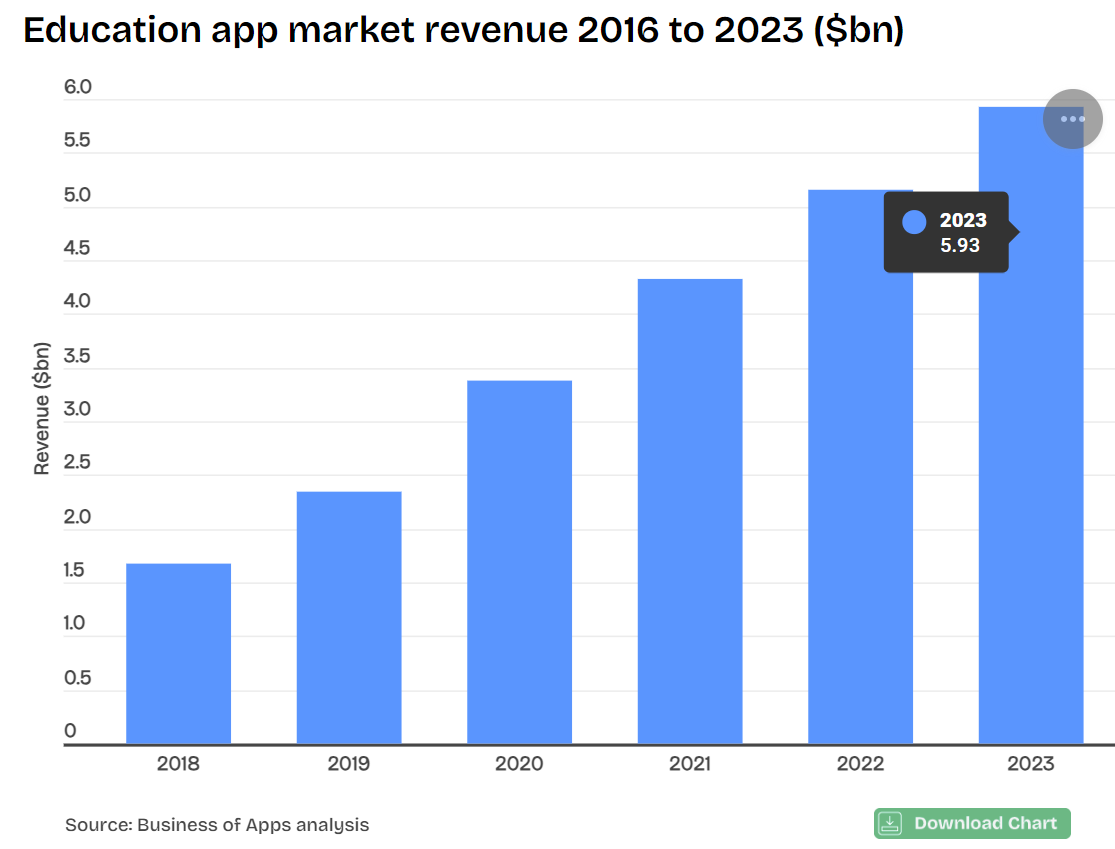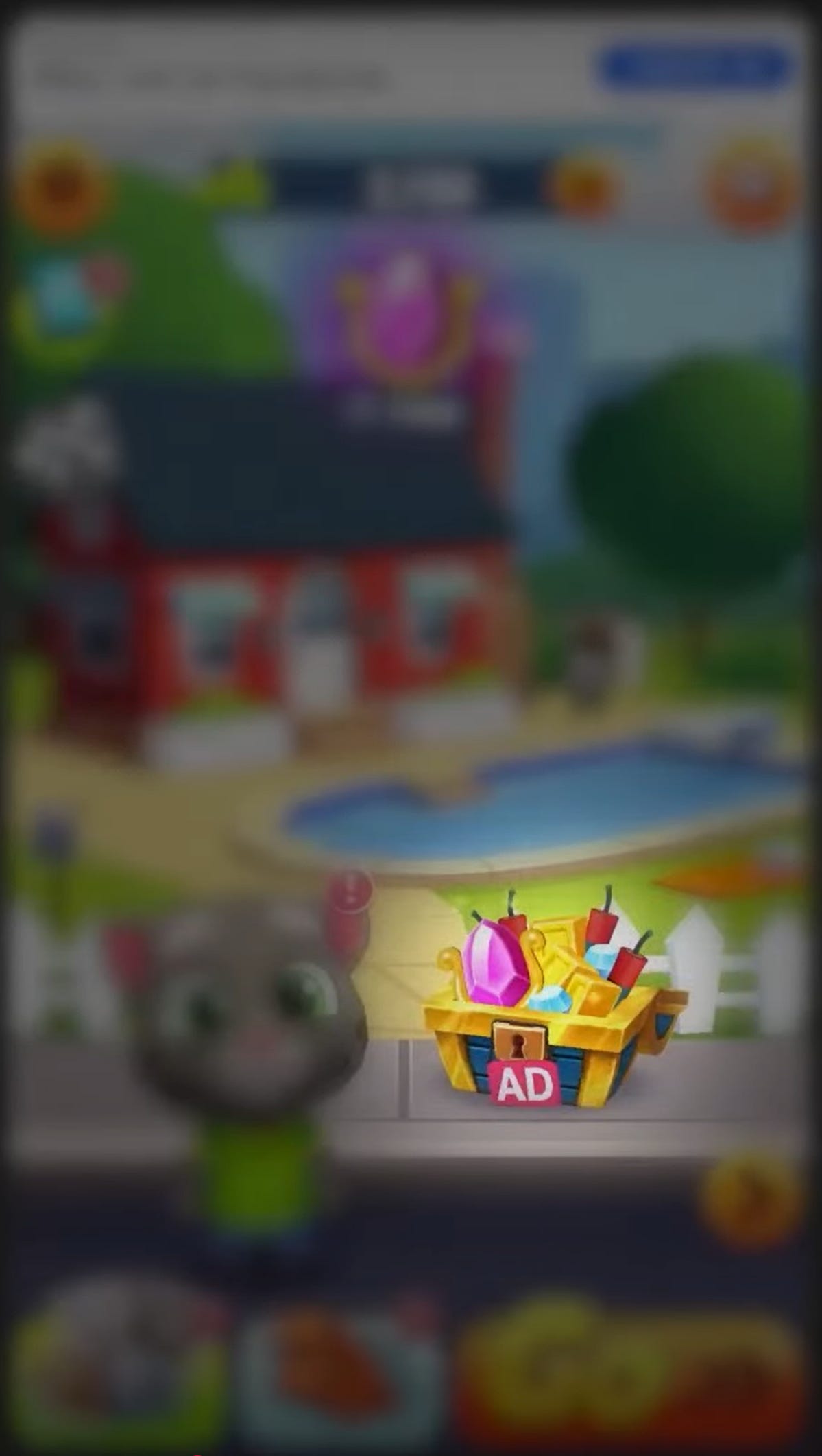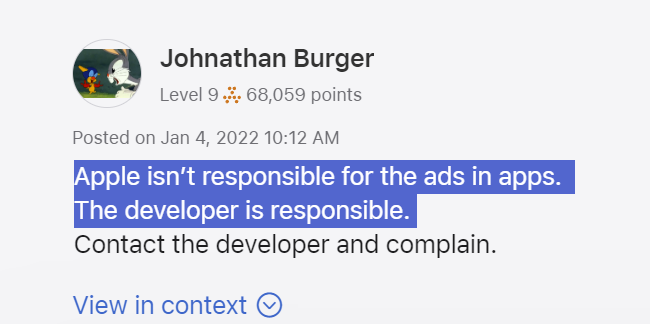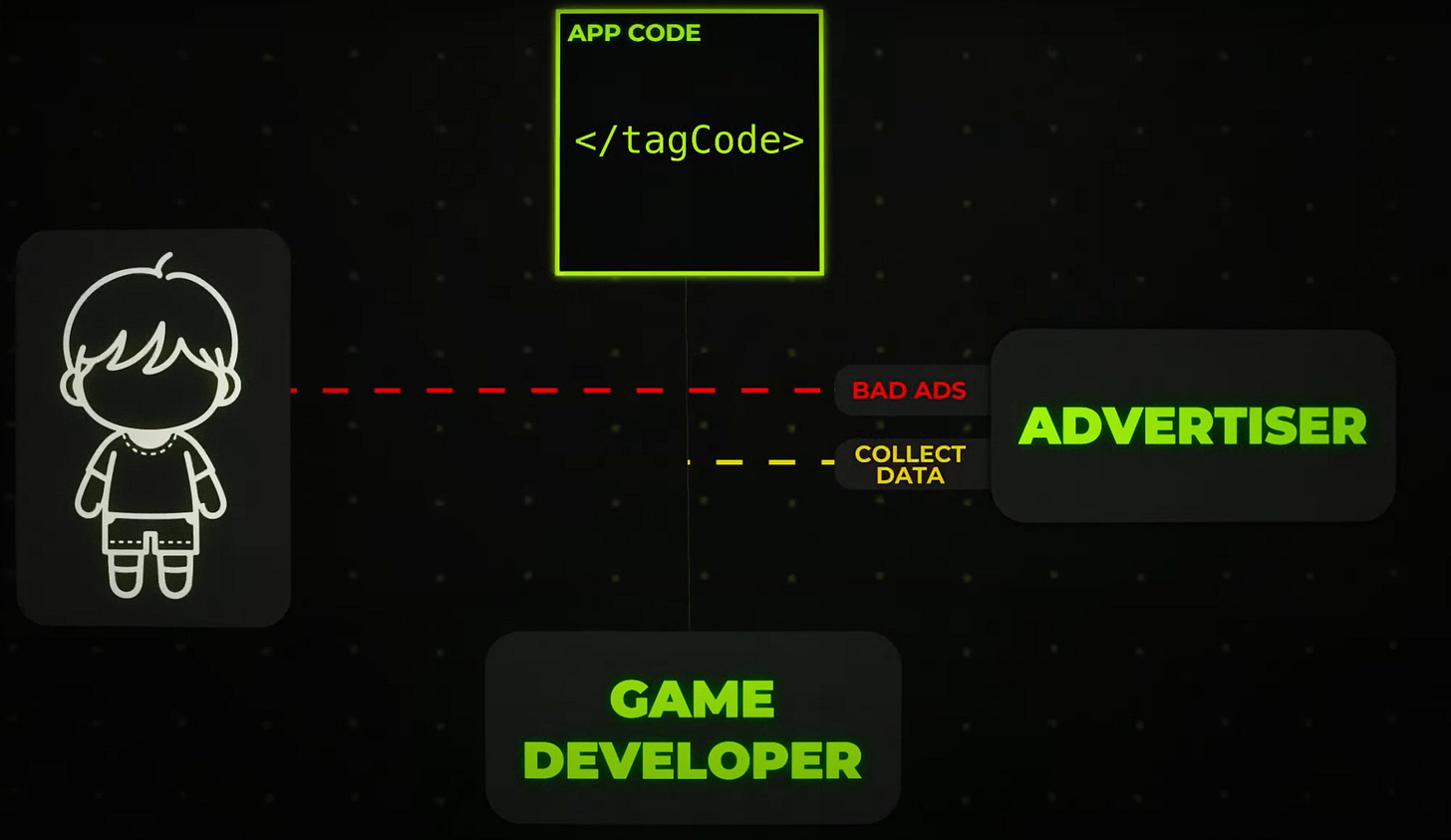The Insidious Side of Kids' Mobile Games
...you think you know, but you don't.
Imagine I’m an 8 yo. Just for a minute. And then watch this video snippet.
As the saying goes: If you’re not paying for a product, you are the product. I knew there’re some weird mobile ads out there, but I didn’t expect to see so many in “educational” kids’ games. Rated ‘Everyone,’ they’re just teaching kids how to click, watch and buy.
Yes I know, there are paid ad-free versions but parents usually hesitate to buy them ‘cos kids always want something new. So this ‘freemium app model’ is very appealing and cashing in on even those who are aware of the problem.
His son is one out of millions of kids unknowingly spending their parents’ money through obscure ads, with bills racking up in the thousands, often times just within a few days!
Well, kids don't really understand what ads are until they're about 8 years old. Before that, they see ads as normal entertainment, no filter. And the earlier a kid learns about a brand, the more likely they'll want the product later.
Many believe children's apps shouldn’t even have ads in them, but kids are a multi-billion-dollar industry, so there's just too much money to be made. We’re talking $6B in revenue in the educational app market alone, with kids apps accounting for 20% of that. And when over 80% of kids under 5 have access to mobile devices, it’s no surprise that aggressive casino-like marketing is being used left and right.
I couldn’t believe how any of this is even allowed. Where are the regulations? And for how long has this been going on? It seems it’s been going on for as long as kids have been watching TV.
Hasbro, the company that owns pretty much every toy brand out there, launched the first-ever TV ad promoting a toy directly to kids - not their parents. It was revolutionary, because never before did a toy on TV speak directly to kids.
But it also opened the flood gate for advertisers to deploy very sneaky tactics.
One of them is known as the “nag factor,” where kids are exposed to the same product over n over again until they pester their parents to buy it. The other, more powerful one is “host-selling,” where a child’s favourite character speaks to them directly, knowing full well how much kids trust them.
Once the public caught on to this trickery, host-selling was eventually banned. But it wasn’t until the Children’s Television Act of 1990 when kids ads were fully regulated. Regulations that still apply today, but just to TV.
The problem is, TV is no longer a kid’s first choice of entertainment - mobile games are. And there, ads play by their own rules. So much so that host-selling and sneaky tactics are making their comeback - and that in 5 different ways.
Banner ads, and you’ve definitely seen them before - flashing and bouncing to catch a kid’s eye and drag it into yet another “free” game.
Native ads, are those that blend in so well, you might not even spot them.
And then there are pop-up ads, the ones that drive us nuts, taking over the screen for a solid 20 seconds before that “X” pops up. And even then, clicking on it takes you straight back to the store with a giant “GET” button waiting for you.
But what’s worse are these ‘camouflaged’ ads. Blending right into the kids game. Shiny objects, gift boxes, in-game items - all ads in disguise. They’re labeled ‘ads,’ but how would a kid know that can’t read?
Now the last ad type, man, that’s the sneakiest. Rewarded ads. These are ads that give kids in-game items for watching an ad. Some ads take it so far and guilt-trip kids for NOT watching, since they’re letting their favorite character down if they don’t. Others want you to watch hundred ads just for one super-rare item.
And what’s crazier is that these rewarded ads give kids a sense of control, as if they’re calling the shots, when in fact, it’s just a classic conditioning. Watch an ad, get a treat. Don’t watch, and you’re letting your buddy down. These guilt-tripping tactics trap kids into a constant reward loop, and because their brains are still developing, these games literally set them up for addiction, depression and low self-esteem.
But guess which ads pay the developer the most? Yup, rewarded ads. That’s why they pop up at every decision point in the game.
But there’s more than just ads at play here. Almost every single kids app is designed just like adult casino apps: Item stores as landing pages. Stimulating sound effects taken straight from casinos. Time-bound pop-ups asking you to come back soon or poor little Tom might starve. Timers everywhere pushing for limited events or discounts. And if you linger too long in the item shop, some apps even ask you to “not just stand there, but do something.”
It’s disturbing, but true. And what many don’t know, is that most of these game companies hire specialized psychologists to work just on those persuasive tactics.
That’s just the tip of the iceberg though. The real issue isn’t just how these games manipulate, but what they exposed.
Strange, horny game ads flooding through kid-friendly games. Games that shouldn’t even be played by adults, they’re so bad. The amount of parents complaining about adult ads is endless, often times with no response other than “uninstall them,” “report it” or “complain to the creator.” Some of those games aren’t even for sale, so there is no way to stop the ads. Others are so graphic, showing people literally jerking each other off! With sounds! Whether it’s prostitution that’s promoted to 4 year olds, interactive story ads, or ads in which hubby is cheating on his chubby wife - the cases are disturbing. Parents desperately ask app stores to help, but the usual answer is always the same: They’re not responsible for these ads. The developer is.
Hold on a second. The developer is responsible for what ads are being shown to kids? Really? Let’s check it out.
When a game dev launches a free app, they hook it up to an ad network, like a middleman between game and advertiser. As kids play, the app requests the ad network for ads. While the dev decides when ads pop up, they don’t choose which ads - that’s on the ad network. But then why do adult ads still slip into kids’ games? Because of flaws in the system. Here’s the thing: Devs are supposed to tag their app as child-friendly, to comply with let’s say Google’s Families policy. But that tag doesn’t block bad ads at all; it only tells advertisers not to collect a child’s data, which is illegal. To really block them out, devs must take a few extra steps. But that’s not something ad networks clearly communicate. So much so, devs scratch their heads on forums as to why their games still show “ads for adult dating websites”, despite the tag. Well, as I said, ironically, that tag has nothing to do with the content. It’s only keeping advertisers from collecting children’s data.
And just like that, a game meant to be safe for kids is showing them things they shouldn't see. Because of loophol..ehem…system flaws. This way no one can be blamed. If game devs, advertisers and ad networks are all colluding…ehem..I mean unaware, responsibility gets real blurry. But mabye this isn’t just an oversight - but a system flaw by design.
It’s called “The Big Catch Playbook.” Created by Meta/Facebok, it tells advertisers how to “overcome the challenge of fishing for the same players in a small pond.” In other words, how to exploit player motivations through ads, also called “baits.” Google has its own “Machiavellian” playbook. “The Winning Combination” - a masterclass of manipulation, with frameworks on how to turn users into spenders. And when you look at the bottom of the book, you see that this isn’t just between advertisers and ad networks - it ropes in game devs too, like Tabtale - now called CrazyLabs - the company behind some of the biggest mobile games for kids, all downloaded millions of times.
Now, what does it tell you when all of this is coming from companies that struck a secret ads deal to target teenagers - from companies that told advertisers it can identify teens feeling ‘insecure’ and ‘worthless’ - from companies that track your data even when your phone’s turned off.
What does it tell you if all this is coming from companies whose kids’ apps are spying on them?
That’s right. Kid’s apps are designed for one thing only: hook them with blatant ads and consumer tactics only to snoop on them. From names, phone & social security numbers to behavioral and financial data, these free kids apps collect every click on a shockingly huge scale. All data they send to companies that track their deepest interests. And all that illegally! You see, the law in the U.S. states that the collection of data from minors under 13 is prohibited. But by the time a child is 13, advertisers have collected an average of 72M data points about one individiual.
How? Through a giant loophole:
When you download a kids’ app, you see an age rating that tells you if the content is appropriate. But, it doesn’t say anything about how the app treats a child’s data. So by labeling an app as “Everyone,” and setting the default age to something like 2000-2001, it “assumes” all players are adults. That way, companies can claim they don’t know who is actually using it.
And if they don’t know who is actually using it, they can pretend their app is a general audience product and track personal information left and right.
And just like that, they’ve bypassed policies - Mission complete.
Now what do app store owners do about it? Enabling it. While they promise you they’ll do what’s best for your family, they rather do what’s best for their YoY growth metric. There is a mountain of studies showing just how many kids’ apps are sending out very private information. All because data is the new gold. Because…
The more data, the more advertisers can predict your buying habits.
The more data, the better developers can tweak the game to keep you hooked.
The more data, the better app stores can maximize profits.
Plus, both Apple’s and Google’s privacy polices are so vaguely written, that “may not include third-party ads” really means “it may include third-party ads.”
It’s heartbreaking. Even if some of you think it’s an open secret, there are so many trusting parents out there that have no idea what’s going on. I played one of CrazyLabs kids’ games and the first prompt that popped up was “On the next popup, allow tracking to help support the game and keep it free. It’ll allow us to provide you with the best personalized ads for you.” A kid can’t read or understand that. So of course it’s quick to click “Allow.”

So how’s is this gonna end? Honestly, it won’t. There is just too much money to be made in a culture dominated by multinational corporations. Sure, they get sued, but the fee they’re paying is peanuts compared to the profit they’re making from millions of families. This won’t end, unless we take action. That doesn’t mean we should avoid free apps, but we should use them consciously. There are so many healthy, kid-friendly apps out there without ads and for little money, that priortize education over profit. Websites like Common Sense Media are a great resource to help families find the right kids’ apps. But what we really need is a Children’s Television Act 2.0 but for mobile apps. Because in a world of too many choices and too little trust, we need must make sure that our kids are not the price of play.


